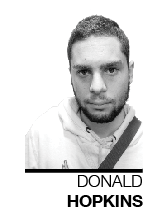 Hopkins argues that while the decision to cut Hebrew as a major is logical, the non-tenured track position is still necessary.
Hopkins argues that while the decision to cut Hebrew as a major is logical, the non-tenured track position is still necessary.
This year, many of the interdisciplinary programs have fallen to the wayside, in the wake of budget cuts and student apathy toward certain academic subjects. Recently, Temple administration announced its intentions to eliminate the Hebrew major effective Fall 2012 and consolidate it within the Jewish studies major. Furthermore, the administration plans to eliminate the only non-tenured track position for Hebrew – occupied by Dr. Ayala Guy. Temple has justified this consolidation as part of a larger trend to save money as well as a response to lack of student interest.
Two questions have to be addressed, when considering whether this elimination and consolidation of the Hebrew major is a good idea for the university and its’ student body. First, is there a benefit to Hebrew existing outside the Jewish studies program as a separate major? Second, is the plan to eliminate the only stable teaching position for the Hebrew language, conducive to the study of language?
In terms of the consolidation of Hebrew into a larger department, it seems logical to make Hebrew part of the Jewish studies program. If students are legitimately not interested in a Hebrew major, in a time of limited resources for education, it makes sense to consolidate it within a department that bears relevance to the subject at hand. Hebrew is a necessary part of any complete Jewish studies education. The story of ancient biblical Hebrew and its renewal as part of the cultural Jewish project is essential to the understanding of Jewish culture, history and religion. Consolidating it within the Jewish studies program allows the continuation of the teaching of a necessary subject while address questions of efficiency and scarce resource distribution.
However, the elimination of the non-tenure track position and the disappearance of a permanent, stable teaching position for the Hebrew program is problematic. The effectiveness of teaching language requires consistency and removing this stable position will mean that Jewish studies students taking Hebrew classes will not be guaranteed the same professor for their Hebrew classes as they move up in difficult levels, disrupting a continuity that is often vital in language comprehension.
Furthermore, the elimination of Guy’s position as a non-tenured track position is worrisome from a perspective of faculty job security. Professor Eliot Ratzman, professor of secular Jewish studies, said that with the elimination of the NTT position, benefits and job security will be lost for the Hebrew teaching faculty, which is a cause for alarm for other non-tenured track positions during a period of budget cuts. The implication of this discussion bears on the importance of stable and secure faculty positions and reaches beyond the elimination of the Hebrew major.
While it makes sense for students and faculty to support valid decisions by the administration to respond to student interest and be responsible with limited resources in a time of educational austerity, the student body and the faculty must be on guard for actions that undermine the necessary security faculty positions and the educational needs of the students. The Hebrew major should be consolidated into the Jewish studies major, but the non-tenured track position should remain as a necessary compromise with the Jewish studies department’s educational needs and the wellbeing of our faculty.
Donald Hopkins can be reached at donald.hpokins@temple.edu.



Be the first to comment